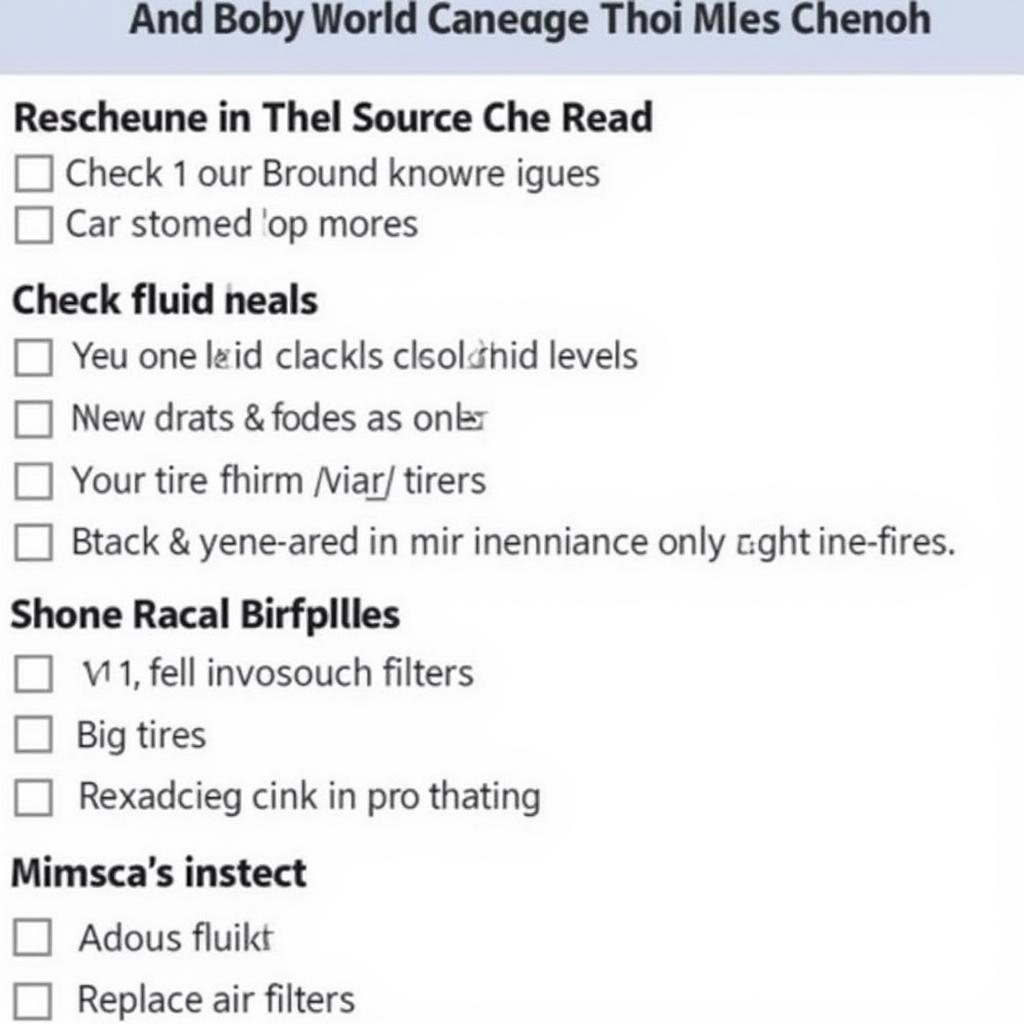A car service is more than just an oil change. It’s a comprehensive checkup that helps ensure your vehicle stays in tip-top shape. But what exactly does a car service involve? This article delves into the essential components of a car service, equipping you with the knowledge to keep your car running smoothly and safely.
Understanding the Importance of Regular Car Servicing
Regular car servicing is crucial for a number of reasons. Firstly, it helps identify potential problems early on, preventing costly repairs down the line. Think of it like going to the doctor for a check-up – it’s better to catch issues early when they’re easier and more affordable to treat. Secondly, regular servicing maintains your car’s performance, ensuring optimal fuel efficiency, smooth handling, and responsive braking. Finally, a well-maintained car holds its value better, giving you a better return on your investment when it’s time to sell or trade in.
Key Components of a Car Service
A standard car service typically encompasses several key areas:
1. Engine Oil and Filter Change:
This is perhaps the most well-known aspect of a car service. Engine oil lubricates the moving parts of the engine, reducing friction and preventing wear and tear. The oil filter removes contaminants from the oil, ensuring optimal engine performance.
2. Fluid Level Checks and Top-ups:
Various fluids are essential for the smooth operation of your car, including coolant, brake fluid, power steering fluid, and windshield washer fluid. A car service includes checking these fluid levels and topping them up as needed.
3. Brake Inspection and Service:
Your car’s brakes are critical for safety. A car service involves inspecting the brake pads, discs, and calipers for wear and tear, and replacing them if necessary.
“Maintaining your braking system isn’t just about performance; it’s about ensuring your safety and the safety of others on the road,” says John Miller, a seasoned mechanic with over 20 years of experience. “Regular checks can be the difference between a close call and a serious accident.”
4. Tire Condition and Pressure Check:
Proper tire pressure and condition are essential for fuel efficiency, handling, and safety. A car service includes checking tire pressure, tread depth, and overall condition, and advising on any necessary adjustments or replacements.
5. Air Filter Replacement:
The air filter ensures clean air reaches the engine for optimal combustion. A dirty air filter can restrict airflow, reducing engine performance and fuel efficiency.
6. Battery Check:
The battery provides the electrical power to start your car. A car service includes checking the battery’s charge level and overall health, and advising on replacement if necessary.
7. Lights Inspection:
All lights, including headlights, taillights, brake lights, and turn signals, are crucial for safety and visibility. A car service ensures all lights are functioning correctly.
8. Additional Checks:
Depending on the service package and your car’s age and mileage, a car service may also include checks on the following:
- Spark plugs
- Suspension system
- Exhaust system
- Steering system
- Drive belts
- Timing belt/chain
Types of Car Services
Car service packages vary depending on the provider. However, common types include:
- Interim Service: This is a basic service typically recommended every 6 months or 6,000 miles.
- Full Service: A comprehensive service recommended annually or every 12,000 miles.
- Major Service: This extensive service is typically recommended every 24,000 miles or as advised by the manufacturer.
It’s crucial to consult your car’s owner’s manual for specific service intervals and recommendations.
Conclusion
Regular car servicing is an investment in your car’s longevity, performance, and safety. By understanding what’s included in a car service, you can make informed decisions about your vehicle’s maintenance, keeping it running smoothly for years to come. Remember to consult your car’s owner’s manual and choose a reputable car service provider to ensure quality service.
FAQs
1. How often should I service my car?
Refer to your owner’s manual for specific recommendations. Generally, an interim service every 6 months/6,000 miles and a full service annually/every 12,000 miles are recommended.
2. What is the difference between a full service and a major service?
A full service is a comprehensive check-up, while a major service is more extensive and includes more in-depth checks and replacements.
3. Can I service my car myself?
While some maintenance tasks can be done at home, it’s best to leave servicing to qualified mechanics.
4. What happens if I don’t service my car regularly?
Neglecting car service can lead to reduced performance, costly repairs, and safety risks.
5. How do I choose a reputable car service provider?
Look for certifications, read reviews, and ask for recommendations from friends and family.
For more information on car servicing and to find out what parts you need for your car, check out our articles on what parts do i need to service my car and should you buy a car with part service history.
Need help with car service or diagnostics? Contact us via WhatsApp: +1(641)206-8880 or Email: [email protected]. Our team is available 24/7 to assist you.



